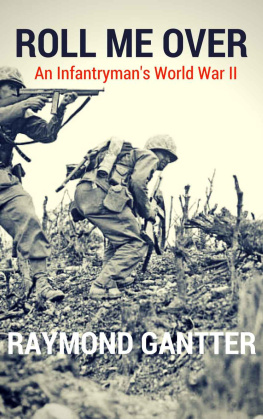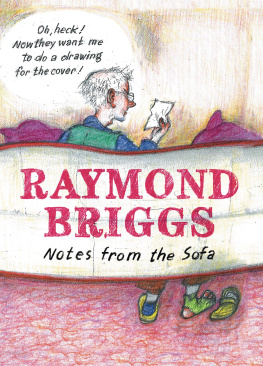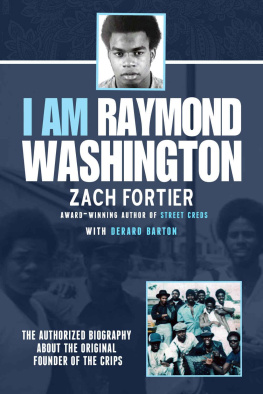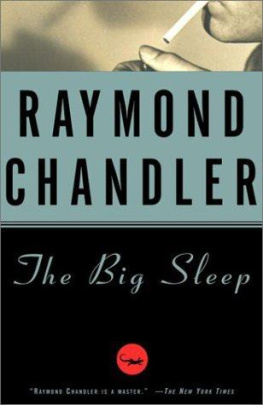Raymond Gantter - Roll me over: an infantrymans World War II
Here you can read online Raymond Gantter - Roll me over: an infantrymans World War II full text of the book (entire story) in english for free. Download pdf and epub, get meaning, cover and reviews about this ebook. year: 2016, publisher: Chu Hartley Publishers, genre: Romance novel. Description of the work, (preface) as well as reviews are available. Best literature library LitArk.com created for fans of good reading and offers a wide selection of genres:
Romance novel
Science fiction
Adventure
Detective
Science
History
Home and family
Prose
Art
Politics
Computer
Non-fiction
Religion
Business
Children
Humor
Choose a favorite category and find really read worthwhile books. Enjoy immersion in the world of imagination, feel the emotions of the characters or learn something new for yourself, make an fascinating discovery.
- Book:Roll me over: an infantrymans World War II
- Author:
- Publisher:Chu Hartley Publishers
- Genre:
- Year:2016
- Rating:5 / 5
- Favourites:Add to favourites
- Your mark:
- 100
- 1
- 2
- 3
- 4
- 5
Roll me over: an infantrymans World War II: summary, description and annotation
We offer to read an annotation, description, summary or preface (depends on what the author of the book "Roll me over: an infantrymans World War II" wrote himself). If you haven't found the necessary information about the book — write in the comments, we will try to find it.
Roll me over: an infantrymans World War II — read online for free the complete book (whole text) full work
Below is the text of the book, divided by pages. System saving the place of the last page read, allows you to conveniently read the book "Roll me over: an infantrymans World War II" online for free, without having to search again every time where you left off. Put a bookmark, and you can go to the page where you finished reading at any time.
Font size:
Interval:
Bookmark:
ROLL ME OVER
An Infantrymans World War II
Raymond Gantter
booksuch Chu Hartley Publishers New York
Copyright 1997 by The Estate of Raymond Gantter
All rights reserved under International and Pan-American Copyright Conventions.
ISBN
To the Infantry the Queen of Battles
Roll me over
In the clover;
Roll me over, lay me down,
And do it again!
A song of the infantry
Foreword
People keep talking about another war as though it were inevitable and only the moment of its coming uncertain, tomorrow, or maybe next week. Self-appointed prophets of doom, all of us. We talk a lot about it, but we dont really think about it because it doesnt bear thinking on: We know (and hide the knowledge from ourselves) that when it comes, if or when this cold war becomes a blaze, it will ravish the world. Atomic warfare, biological warfare, the swift murder of cities and civilianswarfare to make a mockery of the conventions of war, transforming armies into bewildered huddles of uniformed men who scamper crazily to catch up with an adversary who struck ten minutes ago and is now gone and away.
Yet I believe that the next war, like the last one, will require the foot soldier. New weapons and new techniques there will be, new devices to blast and devastate with laudable efficiency, but when the weapons and devices have finished their work, the battered target, the precious, battered inches of ground, will have to be secured and held, and thats a job for the infantry.
This book, then, is at once a tribute to all former infantrymen, a personal narrative for my family, and a rough notebook of sorts for the young men who will be the foot soldiers of the next war.
My original purpose in writing was nothing so lofty. I started to write because I was scared. Most of the time I was scarednot by bullet and shell alone, but by the huge and brutal impersonality of the whole business. Writing about it gave me a measure of control over my fears.
Some of the material in this book is taken from letters written to my wife, Ree. Most of it, however, is drawn from rough notes jotted during the combat months, hastily scribbled observations that, for reasons of security, could not be included in letters home. I started those notes on the day I finished with the homeless misery of the Replacement Depots and joined an outfit, became a member of a family. I wrote as the circumstances permitted, employing whatever material was at handthe backs of envelopes, paper bags, even the wrappers from our miniature packets of GI toilet paper. I carried the notes between my underwear and my shirt to protect them against the weather.
A lot of war books have been written, and perhaps theres nothing in this one that someone hasnt already said. But now that its over and a degree of perspective becomes possible, a couple of things have hit me hard and hit me fresh. One concerns heroism and heroes. Its a commonplace to say that heroes, most of them, are accidental. The thing that surprised me is that a guy can be a hero and a bastard at the same time. Im talking about true heroes, of course, not guys who wear decorations. A lot of phonies are wearing ribbons they never earned, and thats no secret. But I mean a man who does something truly gallant, something that rings inside you like the surging memory of Hector before the walls of Troy. And yet you dont like him. If you didnt like him before, youre surprised to find you dont like him any better now, even though you recognize the magnitude of his act and are awed by it. Hes a hero, sure, but hes still a jerk. That contradiction belongs to war. War is a marriagealmost a rapeof giant opposites. Its everything and all things and all at the same time: bad and good, heroism and cowardice, terror and serenity, feast and starvation, gallantry and bestiality. The wonder is that you can continue to be surprised.
Something that always angered and frightened me was the small horizon of the man in the ranks. Most of the time you dont know whats happening, or why. You dont even know where you are. Its something you force yourself to acceptthe big picture is for the brass, but its none of your damn business. You have a job to do, a town or a hill to take, and you do your job. Sometimes you know the name of the town; sometimes it remains forever in your memory only as That Place Where. I puzzle yet over maps, striving to find certain villages that were significant in my odyssey, but they are like cities on the moon, having no geographical context.
If I were concerned with trying to show you the sweep of war, Id have to do a lot of research, and then Id be able to tell you that on such and such a day, when wed been ordered to take such and such a town, the strategic picture was this and this, and we did what we did because of its relationship to the big plan. But I leave all that for the memoirs of generals. My purpose is to show you the dark side of the medal: how it was to be fumbling and blind, moving because wed been ordered to move, but not knowing where or why. If some faint tin gle of that unreality touches you, you will understand how it was that we were sometimes overwhelmed by black and crawling fear.
Youll find errors, possibly some misinformation in this. Ill try to avoid them and give the true and accurate story, but Im not going to worry much about a few errors of fact. If you at home lived in a world ruled by rumor and misinformation, so did we. You ought to know something about that rumor world of ours.
In marshaling my notes and letters and memories together to form some semblance of continuity, I have frequently been nudged by the disturbing reflection that portions of this book would seem false or distorted or incomplete to many of the men who shared these experiences with me. To all those familiar voices, raised in reproach, incredulity, or shock, I plead only that men, sharing a common experience, saw different things and saw them differently. My view was not complete nor even accurate necessarily, but it was mine.
One last thing: War is supposed to be a young mans business, and maybe it is. And though the age of thirty doesnt usually indicate senility, its not what youd call springtime, either. What Im getting at is this: I went in with a group of men my own age. High school, even college, were long past, and we left wives and children behind us and well-used marriage beds. Because of these circumstances, we saw some aspects of war rather differently from younger men. Im not implying a moral judgment: I say only that we saw some things differently. Sometimes, listening to the talk of the younger men, watching them, I felt old and sagging. They had sap in their veins, which I was aware had run a little thin in mine. But I did all right. I have no complaints.
Raymond Gantter
September 1944-June 1949
CHAPTER ONE
they were still picking up bodies from D Day.
September 1944.
I made the crossing on the Queen Elizabeth. Theres nothing to say about it except that we were too damn crowded, and our quarters were deep in the belly of the ship. We were so hot that we slept naked and dripped waterfalls of sweat through the thick canvas of our bunks. Sometimes we tried to sneak up to the decks to sleep, but always the guards would discover us and make us go back down. The food was lousy.
A few days before leaving Camp Shanks, Id been named an acting noncom (noncommissioned officer) to serve as assistant to the orientation officer of our shipment. The assignment made me pretty happy because I thought it was a little more up my alley than toting a gun in the ranks, and I attended the three-day orientation school at Shanks with zest I believed ardently in the importance of finding out what we were fighting for, and I thought I knew some of the answers. Unfortunately, the orientation officer on the Elizabeth shared neither my ardor nor my convictions. He was a fuzz-faced college boy, not yet twenty-oneI was painfully conscious of my seniority in age and his seniority in rankand he didnt believe in books, didnt believe in theories that fell short of a solid, unequivocal QED, and thought the entire Orientation Program of the army a lot of damn-fool nonsense. In fumble-tongued bluster he stated that unless a book contained facts that you could provehe named a text on engineering as an exampleor was written for amusement only (like the Thorne Smith novel he was reading), it served no legitimate purpose and might better be burned or thrown away. I tottered away and sat in the latrine with my head in my hands, cursing the army and bemoaning my lot in life.
Next pageFont size:
Interval:
Bookmark:
Similar books «Roll me over: an infantrymans World War II»
Look at similar books to Roll me over: an infantrymans World War II. We have selected literature similar in name and meaning in the hope of providing readers with more options to find new, interesting, not yet read works.
Discussion, reviews of the book Roll me over: an infantrymans World War II and just readers' own opinions. Leave your comments, write what you think about the work, its meaning or the main characters. Specify what exactly you liked and what you didn't like, and why you think so.









